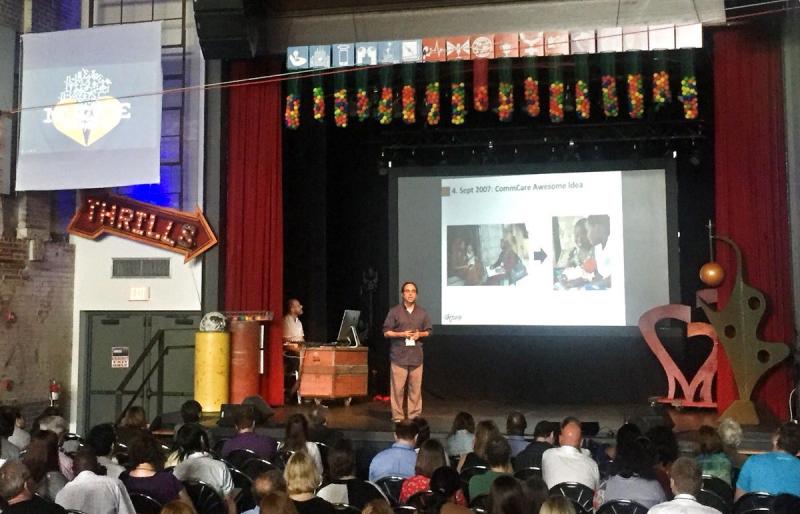Where We Work
See our interactive map


Neal Lesh at SwitchPoint 2017. Photo courtesy of Dimagi.
When you're developing new ideas or tech, failure isn't such a bad thing. But for health workers, it means something else.
I had the good fortune of attending and presenting at the 2017 SwitchPoint conference, organized by Intrahealth International, in Saxapahaw, North Carolina. SwitchPoint brings together musicians, innovators, health practitioners, and a wider range of people working in global health and humanitarian response, for a few days of information sharing and soul searching.
The event is highly produced (while I was waiting to give my talk, the people upfront radioed backstage that I should wait an extra 15-seconds while my walk-on music was playing), and creates a sense of each thing flowing into the next.
By putting people who do not typically work together in the same, secluded space and juxtaposing ideas that are seemingly unrelated, the meeting sparks creativity and self-reflection in the speakers, as well as the attendees.
We aspire to fail fast so we can move on to trying the next thing.
The word that comes to mind to best capture my experience is “vulnerability”.
There was no jockeying to be seen as the smartest person in the room. Many people talked about mistakes or losses in their experience and how these events shaped their work. It’s common for information technologists to urge our colleagues from public health and medicine to embrace failure.
We know that the innovative things we build often don’t work on the first try; we must test them out to see what breaks, and then fix the problems.
We aspire to fail fast so we can move on to trying the next thing, which might work or might uncover a new set of problems to fix. In fact, if you’re not failing at all, it means that you are not trying enough new things, which means that you’ll soon be obsolete.
At Dimagi, we often speak about our “design under the mango tree” approach, which involves introducing technology in its early stages to real users, getting their feedback, and then improving the technology based on this feedback. We also promote the need for continuous, incremental improvement of digital technology once it is launched by introducing new variations and testing which ones improve performance.
I don’t want my health providers to fail fast.
During SwitchPoint, I was moved to hear several health practitioners share stories of patients who had not survived despite their best efforts. In some cases, there was a clear lesson or uplifting element to the story, but in others it was a formative moment in their experience. Listening to these stories, I had a sudden realization that now seems obvious:
I don’t want my health providers to fail fast.
Similarly, I don’t want a genius medical researcher to boast about having found a thousand ways not to cure a disease—even if this is what they have to do in order to discover a cure.
While learning from failure is essential in medicine and public health, each failure can be a profound loss. What I’ll take from Switchpoint is a better understanding of why some of our partners may resist an iterative testing approach that inherently involves learning from failure. That resistance is often connected to a commitment and their training to provide the best possible care for each patient.
At Dimagi, we’ll certainly continue our “design under the mango tree,” and advocate for continuous improvement of digital systems via ongoing testing of new ideas. It’s the only way we know to develop a system that provides the most value to its users. But I’ll now work harder to incorporate this approach into a health systems perspective, and see if we can reframe the virtues of failing fast and testing ideas we are uncertain about.
Finally, I’ll aim to be more mindful of the stories of failures that most health workers carry with them.
This post originally appeared on the Dimagi blog.
Get the latest updates from the blog and eNews




